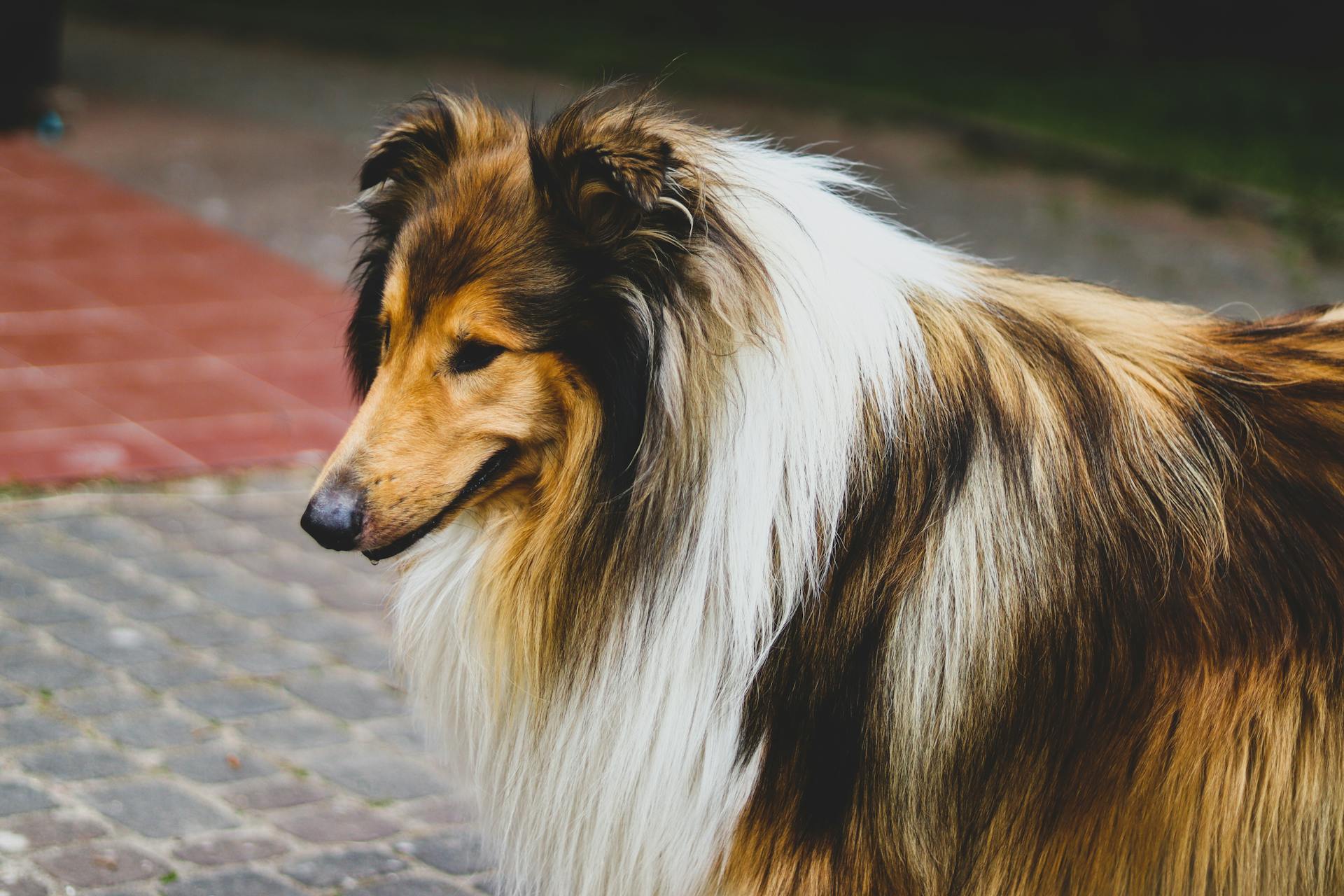
Recognizing the signs of death in a Shih Tzu can be a difficult and emotional experience for pet owners.
As a Shih Tzu's health declines, they may exhibit a decrease in appetite, which can be a sign that they are no longer interested in food or are having trouble eating.
Shih Tzus may also experience a decrease in water intake, which can lead to dehydration and exacerbate existing health issues.
A Shih Tzu's breathing may become more labored and shallow as their body struggles to process oxygen.
Their once-lustrous coat may become dull and matted, reflecting their overall decline in health.
Palliative care can provide a Shih Tzu with a more comfortable and dignified end-of-life experience, focusing on managing pain and symptoms rather than treating the underlying illness.
By understanding the signs of death in a Shih Tzu, pet owners can make informed decisions about their pet's care and ensure they receive the best possible quality of life.
Additional reading: How to Take Care of Shih Tzu
Pet Dying Signs
Your Shih Tzu may begin showing signs that their life is coming to an end, whether due to old age or a terminal illness.
A decrease in appetite is one of the signs your Shih Tzu may exhibit as they approach the end of their life. This can be a significant indicator that they're struggling to eat due to a lack of interest or difficulty swallowing.
Your Shih Tzu's energy levels may also decrease, making it difficult for them to get up from a lying down position or even move around. This is a common sign that their body is weakening.
As your Shih Tzu's life comes to a close, they may start to show a decrease in water intake, leading to dehydration. This can be a sign that their body is not functioning properly.
Your Shih Tzu may also start to show a decrease in bathroom habits, such as urinating or defecating less frequently. This can be a sign that their kidneys are not functioning properly.
You might enjoy: Shih Tzu Show
Your Shih Tzu may start to show a decrease in social interaction, becoming more withdrawn and less interested in playing or interacting with family members. This can be a sign that their quality of life is decreasing.
If your Shih Tzu is showing several of these signs, it's essential to make an appointment with your veterinarian to discuss quality of life and create an end-of-life plan.
Comfort and Care
As your Shih Tzu's health declines, it's essential to prioritize their comfort and well-being. Staying close to them and providing gentle care can make a significant difference in their final days.
Sit with your dog and pet them as much as you can. Talk to your dog in a soothing voice and tell them everything will be okay. Dogs are very sensitive to your emotions, so try to remain calm and comforting as much as possible.
Maintaining a normal routine can also help your Shih Tzu feel more at ease. Continue to take them on walks and play with them as long as they are capable. Monitor their behavior and never push them to do more than they can do.
If your Shih Tzu is experiencing significant discomfort or pain, talk to your vet about medication options. Medication can help alleviate symptoms such as vomiting or shaking, but it won't prevent their passing.
A fresh viewpoint: The Dog Breed Shih Tzu
Comforting a Dying
As your dog grows older, it's essential to prioritize their comfort and well-being. One of the most important things you can do is stay close to them, as many dogs will seek comfort during this time and may desire more attention and care.
Sit with your dog and pet them as much as you can, talk to them in a soothing voice, and tell them everything will be okay. Dogs are very sensitive to your emotions, so try to remain calm and comforting as much as possible while showing them love and kindness.
It's also crucial to avoid introducing your dog to new people or places, as this can cause too much stimulation and be distressing to them. Keep your dog in places where they are comfortable and avoid new locations, especially if they're experiencing mental confusion.
Here are some tips to keep in mind:
- Keep your dog's environment calm and familiar.
- Avoid introducing new people or pets to your dog.
- Be gentle and kind when interacting with your dog.
- Monitor your dog's behavior and adapt your habits to suit their abilities.
As your dog's health declines, it's essential to maintain normal activities as long as they are able. Continue to take them on walks and play with them, but be mindful of their limitations and never push them to do more than they can do.
In-Home Palliative Care
Palliative care is available for dogs, just like it is for humans.
Talk to your vet about minimizing your dog's discomfort in their final days.
Many mobile veterinarians offer in-home hospice care for their patients.
Taking care of your dying dog in the comfort of their own home helps prevent unnecessary stress.
You can say goodbye to your dog in a quiet, peaceful environment of your choosing.
Pain and Discomfort
As your dog ages, you may notice an increase in pain and discomfort. This can be a sign that they're struggling to get comfortable.
Your dog may sleep more than usual, which can be a sign of pain or discomfort. They may also have trouble getting up or going outside to use the bathroom.
Panting at rest is a common sign of pain in dogs. They may also cry out or show signs of aggression when touched in painful areas of the body.
It's essential to keep an eye on your dog's behavior and look for these signs of pain and discomfort. If you notice any of these signs, make an appointment with your veterinarian to discuss quality of life and create an end-of-life plan.
Detachment

Dogs love to be near their loved ones, so detachment can be a clear sign that your dog is dying. This can be as subtle as heading to bed early while the family is still together in another room.
Dogs may hide in a closet or underneath the porch, which can be a dramatic sign of detachment. They may also avoid interacting with family members.
Their detachment can be a sign that they're feeling unwell or in pain, and may be trying to conserve energy. As a dog owner, it's essential to pay attention to these subtle changes in behavior.
Terminal Illness
As a Shih Tzu owner, it's essential to recognize the signs of terminal illness in your furry friend. Difficulty breathing is a common symptom, where your dog's breathing rate slows down significantly, often to as few as 10 breaths per minute.
You may notice your Shih Tzu's breathing becoming shallow, with long intervals in between breaths. This can be a sign that they're struggling to get enough oxygen.
Lack of appetite is another telltale sign, where your dog shows no interest in eating or drinking water. Organs like the liver and kidneys may slowly shut down, making it difficult for your dog to digest food.
Twitching or involuntary muscle spasms can also occur, caused by a lack of glucose and other essential nutrients. This can lead to problems controlling their muscles, making it hard for your dog to respond to painful stimuli.
Loss of bladder or bowel control is a common symptom, even in well-trained Shih Tzus. This can be an upsetting sign, but it's essential to remember that it's a natural part of the dying process.
Serious changes to the skin, such as dryness or loss of shape, can also indicate terminal illness. Dehydration can cause these changes, making it essential to monitor your dog's water intake.
Here are the major symptoms of terminal illness in Shih Tzus:
- Difficulty breathing
- Lack of appetite
- Twitching or involuntary muscle spasms
- Loss of bladder or bowel control
- Serious changes to skin
Aging and Decline
As your Shih Tzu ages, you may notice cognitive issues similar to Alzheimer's Disease, causing anxiety, confusion, and irritability. They may whine, pace, bark, or seem to get "lost" in their own home.
Cognitive dysfunction can be a difficult and distressing sign that your Shih Tzu is dying. Your dog's brain is showing the cruel signs of aging, just like people do.
If you notice your Shih Tzu showing several of these signs, make an appointment with your veterinarian to discuss quality of life and create an end-of-life plan.
Related reading: Shih Tzu Aging
Behavior Before Death
As your dog ages, you may notice changes in their behavior that can be a sign of their declining health. They may become more confused or disoriented, much like people with Alzheimer's Disease.
Cognitive dysfunction is a common issue in older dogs, causing them to whine, pace, bark, or seem lost in their own home. This can be distressing for both you and your dog.
Your dog may also start to show signs of anxiety or irritability, which can be a sign that their life is coming to an end. These changes in behavior can be subtle, but it's essential to recognize them to ensure your dog's quality of life.
If your dog is showing several of these signs, it's crucial to make an appointment with your veterinarian to discuss their quality of life and create an end-of-life plan. This will help you prepare for their final days and make the best decision for their well-being.
Shih Tzu Kidney Issues
Renal dysplasia is a common kidney problem that Shih Tzus can experience.
This condition occurs when the kidneys fail to fully develop, leading to a range of symptoms.
Excessive urination and increased thirst are two of the most noticeable symptoms of renal dysplasia.
Other symptoms include blood in the urine, loss of appetite, and slow healing of wounds.
If you notice any of these symptoms in your Shih Tzu, it's essential to take them to the vet for a diagnosis.
The vet may recommend a change in diet, prescription medication, or in severe cases, dialysis and kidney transplantation.
Here are the common symptoms of renal dysplasia in Shih Tzus:
- Excessive urination
- Increased thirst
- Blood in urine
- Loss of appetite
- Slow healing of wounds
- Abnormal body temperatures
- Loss of desire for activity
- Vomiting
- Diarrhea
- Pain
Common Liver Diseases
As dogs age, their liver function can decline, leading to various health issues. Chronic hepatitis, a common liver disease in Shih Tzu, can cause liver inflammation, resulting in weight loss and a yellowish hue to the skin.
Liver inflammation can be treated with medication to eliminate fluid buildup, and supplements may be introduced into the dog's diet to help manage the condition. Restricting sodium intake is also crucial.
Shih Tzu can also develop Canine Portacaval Shunt, also known as Liver Shunt Disease, which affects the processing of ammonia. This condition typically doesn't show symptoms until the dog is six years or older.

Symptoms of Liver Shunt Disease include weight loss, fatigue, vomiting, excessive urination, and excessive thirst. If you notice these symptoms in your dog and he's six years or older, have his vet perform an examination and determine a proper course of treatment.
Here are some common liver diseases in dogs:
- Chronic hepatitis: causes liver inflammation, leading to weight loss and jaundice
- Canine Portacaval Shunt (Liver Shunt Disease): affects the processing of ammonia, leading to symptoms like weight loss, fatigue, and vomiting
Signs of Normal Aging
As your dog ages, it's essential to recognize the signs of normal aging to avoid unnecessary stress and anxiety. A general loss of energy is a common sign of old age, but it's not a reason to panic just yet.
Your dog may not be as energetic as they used to be, but if they're still able to eat, drink, walk, stand, and respond to your calls, they're just getting old. In fact, older dogs generally require fewer calories and need less food than energetic younger pups.
Older dogs sleep a lot, and that's perfectly normal. So long as they're still able to stand, move around, and eat, an increase in snoozing is just a sign of aging.
See what others are reading: Old Shih Tzu
A loss of interest in playtime with other dogs is also common as dogs get older. They may get overwhelmed or irritable in social situations more easily than before, but that doesn't mean they're not social anymore.
Your dog may not be as playful as they used to be, but if they still enjoy being outside, find them a cozy and secure spot to lie in the backyard. If they like car rides, take them for short drives around the neighborhood and open the windows to let them smell the fresh air.
A few gray hairs and a droopier face are also signs of old age, but that's not the end of the world. So long as they're still reasonably content and they aren't in pain, they're fine.
Related reading: Shih Tzu Hypoallergenic Dogs
Euthanasia and Next Steps
If you've decided that euthanasia is the best choice for your Shih Tzu, make sure to keep them comfortable in the days leading up to goodbye.
Your vet can help you understand the purpose of euthanasia, which is a gentle and humane method of ending the life of an animal that is suffering.
To weigh the pros and cons of putting your dog down, consider what's best for them and try to remove your desire to hold on to your dog.
Talk to your vet about whether euthanasia is the best choice, and they can assess your dog's condition through tests and give you an idea of what kind of quality of life you can expect.
Research the medical conditions that warrant euthanasia, such as any condition that causes pain and suffering that cannot be easily cured or managed.
If you observe signs that your dog is ready for euthanasia, call your vet immediately and bring your dog in for an exam.
Here are some signs that your Shih Tzu may be ready for euthanasia:
- Persistent pain and suffering
- Difficulty breathing or eating
- Loss of interest in activities
- Changes in behavior or personality
- Weight loss or loss of muscle mass
Remember, your vet is an excellent resource and can help you make the best decision for your dog.
Key Information
If you suspect your Shih Tzu is actively dying, look out for labored breathing and an inability to control their bowels or bladder.
Signs of aging in Shih Tzus can be subtle, but may include slow movements and a change in appetite.
A refusal to eat is a red flag that warrants a vet visit, and your vet will be able to provide concrete guidance on when it's time.
Discuss euthanasia with your vet if your Shih Tzu is in a lot of pain.
Here are some key signs to watch for:
- Labored breathing
- Inability to control bowels or bladder
- Refusal to eat
- Lack of reaction to stimuli
Frequently Asked Questions
What shuts down first when a dog dies?
When a dog is nearing death, its digestive functions are often the first to shut down, leading to a loss of interest in food and water. This is typically followed by other bodily functions, including the development of dehydration and other symptoms.
What is the leading cause of death for Shih Tzus?
According to veterinary records, the leading causes of death for Shih Tzus are gastrointestinal diseases, heart disease, and poor quality of life, each accounting for approximately 7.9% of fatalities.
What is the life expectancy for a Shih Tzu?
A Shih Tzu's life expectancy is typically between 10 to 16 years, with some living up to 23 years in exceptional cases.
How do I know if my Shih Tzu is ill?
Watch for signs like wheezing, difficulty breathing, or lethargy, which can indicate a serious health issue in your Shih Tzu. If you notice any of these symptoms, seek veterinary care immediately
Sources
- https://agapepetservices.com/dog-dying-saying-goodbye/
- https://www.wikihow.com/Recognize-a-Dying-Dog
- https://www.leesvilleanimalhospital.com/blog/2016/june/how-do-i-know-when-my-dog-is-dying-/
- https://www.eliteveterinarycare.com/blog/signs-your-dog-is-dying-is-it-time-to-say-goodbye
- https://www.everythingshihtzu.com/dog-health.html
Featured Images: pexels.com


